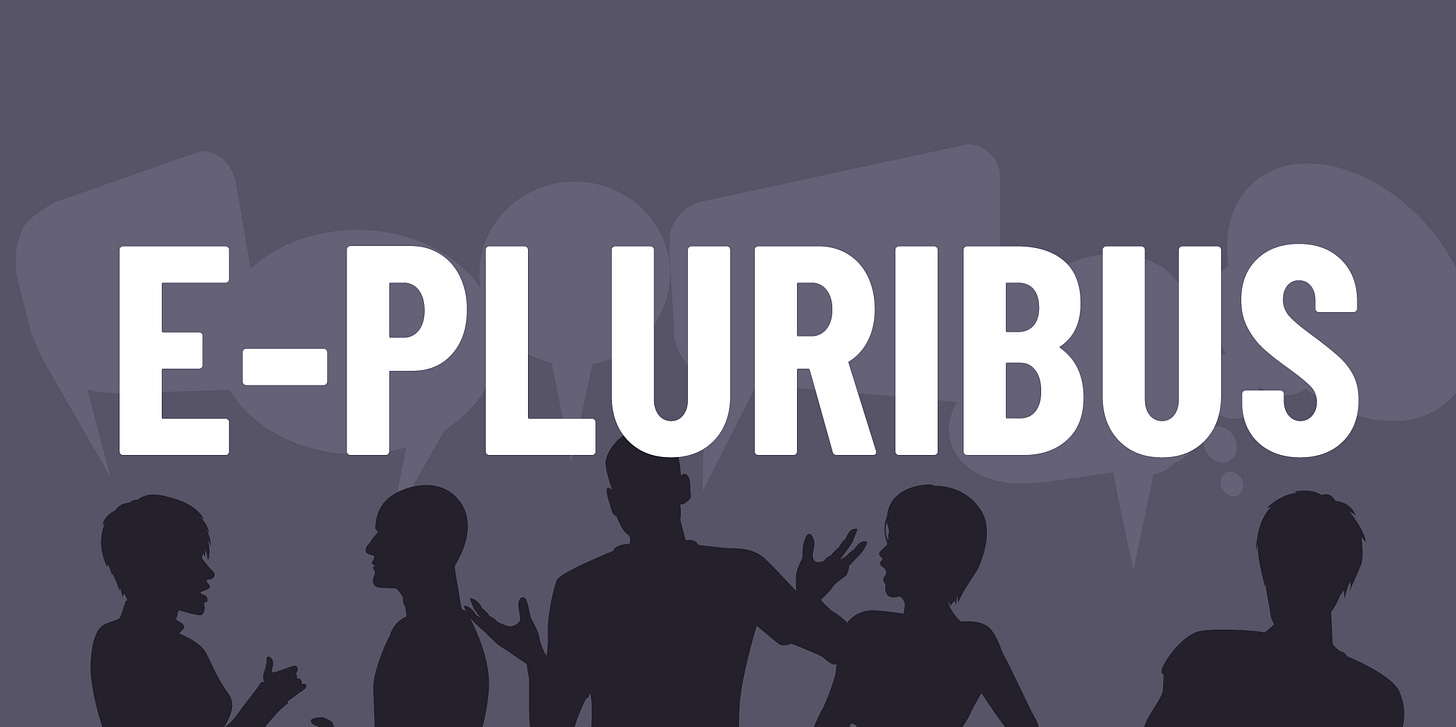E-Pluribus | April 28, 2022
The war on Western culture, the Texas legislature's left-wing approach to social media, and surprised by civility.
A round up of the latest and best writing and musings on the rise of illiberalism in the public discourse:
Gerry Baker Podcast: Douglas Murray and the War on Western Culture
This week at the Wall Street Journal, Gerry Baker hosted author Douglas Murray on his Free Expression podcast to discuss Murray’s new book, The War on the West. Below is an excerpt from the podcast transcript where Murray sets the stage for his thesis that reducing everything to race is a major part of the attack on Western culture.
Racism has existed in every society in human history. It's a very ugly trait, one of the ugliest human traits, and it has existed in the West, of course, and there's undoubtedly racism that goes on today. However, there's only one permissible form of racism, and that permissible form is racism against White people about whom almost anything can now be said. And I write in the first chapter in the book about this phenomenon. Every month, there is a new pathologizing term about Whiteness. You get people like bestselling author Robin DiAngelo, writing about White fragility. You get people coming up with White tears, White female tears. Just last year, we had suddenly invented White rage. And anyone who thinks that these are obscure tendencies or obscure ideas that don't really have any impact on the real world should remember that no lesser figure than General Mark Milley, the Chairman of the Joint Chiefs of Staff, was talking about this White rage in front of Congress last year. He was willing to play along with this same game, this pretense that White people can be talked about in terms that would simply not be tolerated if any other group of people were being talked about in this way. So the first thing is a war, weirdly, a war on the majority populations in Western countries, a very remorseless, very ugly, very demeaning war against them on the basis of nothing other than skin color. Then you get the war on the Western history, and that, for America in particular, is one of the most devastating things, where people in the West, particularly America, are born into a kind of sin. Particularly, obviously, White Americans are born into a kind of sin and everyone else is born into a type of virtue so that, for instance, instead of seeing that racism is a part of American history, as it is a part of the history of peoples across the world, it is seen as the story of America, that instead of it being part of the story of America, slavery is the founding of America. And, again, not an obscure origin. That 1619 Project is a project of the New York Times trying, as it says on its own terms, to reframe the founding date of the American Republic so that it is founded in slavery. Then you get the war on Western ideas, Western religion, Western philosophy, where everybody who created both the religious and the secular traditions in the West has in recent years been torn down remorselessly for, again, sins of being alive in the past and not happening to share all of the views that we might have in 2022. And then, finally, the war on Western culture where absolutely everything in the culture from the arts, from music to literature and much more is also torn apart and only seen in this remorseless and unforgiving light of saying, "If there's anything that can be pinned on it that has anything to do with slavery or colonialism then we will pin it on it and it will have to be looked at through that light."
Read the whole thing.
Thomas Berry and Nicole Saad Bembridge: Texas' Social Media Law Recycles Left-Wing Media Theory
As frustration has grown among Republicans and conservatives over mistreatment by the mainstream media and Big Tech, overreach in response has also grown. Thomas Berry and Nicole Saad Bembridge at Reason explain how Texas has borrowed from the left’s playbook to try to rein in social media and, in the process, is undermining the First Amendment protections they ostensibly are trying to preserve.
One of the most aggressive of these Republican-led efforts to regulate social media is Texas' H.B. 20. Ostensibly passed to combat the "dangerous movement by social media companies to silence conservative viewpoints and ideas," this bill prohibits social media platforms from removing users or content "based on the viewpoint" of the user or content. In its effort to protect conservative speech, Texas Republicans have adopted a historically discredited left-wing legal theory, dispensing with core conservative values in the process.
In the 1960s, a group of progressive scholars argued that the First Amendment does not merely prohibit the government from censoring private speech and press. In fact, they argued, it granted the government the affirmative power to control the mass media. In a capitalist system, they reasoned, the government must ensure that private media owners do not exclude unwelcome viewpoints, in order to protect the "democratic interest" in free speech. To this end, the scholars championed the Fairness Doctrine, right-of-reply mandates, and expansive applications of "common carriage" doctrine, which enable the government to force the inclusion of certain content.
Borrowing from the same playbook, Texas now argues that First Amendment values require, rather than prohibit, government interference with private speech. H.B. 20 declares that social media platforms are common carriers like telephone companies and thus are subject to onerous restrictions over who and what they may host. According to Texas, H.B. 20 serves the democratic interest in protecting the free exchange of ideas and information. But like the collectivist efforts that preceded it, Texas' misguided attempt to advance "First Amendment rights in the Lone Star State" violates private platforms' First Amendment rights to choose what speech they publish.
Read it all here.
Kathleen Parker: What I learned from one man’s help and civility
At the risk of sliding into cliché, sometimes it’s the little things that make all the difference. In a social media environment that can quickly devolve into name-calling, nastiness and even threats, this short and sweet anecdote from Kathleen Parker at The Washington Post is an example of how our approach with others can redound not only to their benefit, but our own as well.
Christian breezed through the paperwork. Competence, too? Now, I was about to break into song. He was just doing his job, you might be thinking, but he did it with such cheer that I couldn’t help responding in kind. One smile begets another; one kind gesture invites another. Such simple civility. When did it become so rare that I’m startled by it? Was it the pandemic, or did covid-19 merely place a headstone on the graves of common cause and community?
As I was noodling these questions, Christian grabbed my bags and walked me to my awaiting car. I thanked him and said, “It’s so nice to see someone smile.” His response blew me away.
“I smile because other people are going to have a bad day,” he said. “But I’m not going to have a bad day because I’m going to change someone’s day.” I just looked at him, wondering how he had become this person — so wise and kind. I was about to ask, but he was already turning back toward the station. I called after him: “You changed my day!” He looked over his shoulder laughing and, I could have sworn, skipped away.
Read it all.
Around Twitter
Via Heterodox Academy, a debate over free speech in higher education:
Some observations from Matt Yglesias on Elon Musk and the apparent futility of Musk’s progressive credentials:
And finally, when all you have is a hammer:













First of all, where is it reported that Musk is “mad at Biden”? There is a tendency for people to exaggerate things—imagine that. As in, a boss calls an underling into her office and tells her that she missed something in her work and she has to remedy the situation. A co-worker later asks what happened. She reports that her boss called her into her office and yelled at her. Any criticism now = “yelling” at the one being criticized. Either you love what someone is doing or you’re yelling at them. No middle ground.
You open your car door and it bumps the car next to you. The person describes it as “he wrecked” into my car.
No one has a headache. Everyone has a “migraine.”
Middle ground no longer exists. Things are either black or white. Unblack = white and vice versa.
So, is Musk annoyed or ticked off at Biden? Is he in a blind rage at him? Hard to see why he’d bother. But consider that before Musk/Tesla, EVs = golf carts. Musk has been to EVs what Bach was to the fugue. Like the Wilbur and Orville a bit over a century ago, Musk has been solving problems that the usual suspects hadn’t even been seeing exist. So ignoring him in a discussion of EVs reperesnts either unfathomable stupidity or blatantly petty partisanship.
The pettiness, if there is any, isn’t coming from Musk.